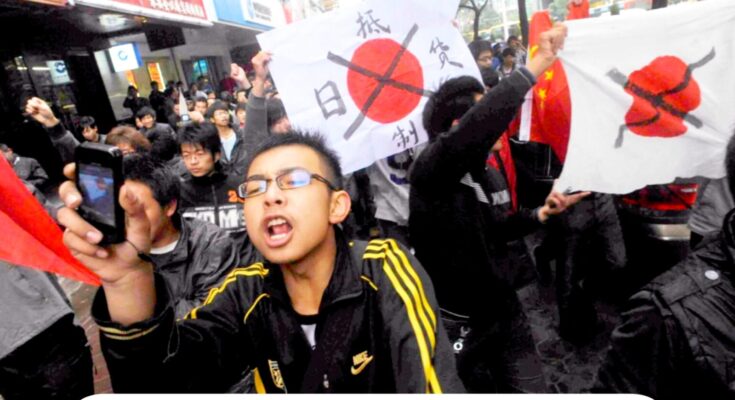Politics News: Money, Power, and the Danger of Chinese Nationalism
A Chinese ultra-nationalist video blogger saw the words “Happy 2024” written in red circles on the glass doors of a Nanjing mall in January.
The blogger asserted that the red circles, which mirrored the rising crimson sun in Japan’s national flag, were nationalist Japanese symbols hidden behind what looked to be innocent New Year’s decorations.
This isn’t Tokyo; this is Nanjing! Why are you discarding trash in this manner?” He told a manager of a mall.
When the local police became involved, they gave the mall employees instructions to take down the decorations and gave the mall management a written warning.
According to Alice Lu, a 33-year-old Shanghai noodle store owner, “it’s the funniest thing I’ve ever heard,”Users on Chinese social media emphasized the ridiculousness of all the red circular objects that need to be outlawed, including the logo of the Chinese telecoms company Huawei, China, in accordance with the standards set by the local police in Nanjing. Posters featuring the first communist leader of China, Mao Zedong, the traffic lights, and the rising sun in the distance.
Title: The Story of Hoka Shoes: Unveiling the Comfort Revolution
Following his failure, the blogger was reprimanded by China’s state-run CCTV in a Weibo post, which described his acts as “harmful to individuals, companies and society as a whole”.
Chinese studies expert Shao Yuan of Rutgers University in the United States claimed that the CCTV remarks demonstrated an effort by the Chinese government to keep state control over nationalist themes.
“They wish to make sure thatIn June, Xi stated that “love for one’s country, feeling devotion and attachment to one’s motherland is the duty and responsibility of every Chinese” , along with “the essence of patriotism is to love the country, the party and socialism.” Is. immediately.”
China introduced a new “patriotism” in early January with the declared goal of fostering “love for the country and the ruling Chinese Communist Party (CCP)”, underscoring the significance of state-defined patriotism. The “Education Act” became operative.
Dangers of Anti-Foreign Nationalism in China
This sense of patriotism has been demonstrated by Xi’s “wolf warrior” Chinese diplomats during his administration. One such diplomat, Zhao Lijian, a former spokeswoman for the Foreign Ministry, stated that Wuhan might harbor the COVID-19 virus. 19 The coronavirus’s spread is the fault of the US military.
ZhaoChinese nationalists often enjoy harassing Americans on the internet. However, China’s media and nationalist pundits abruptly reduced their harsh criticism of the United States in the run-up to a much-awaited summit between President Xi and US President Joe Biden in November.
Yuan claims Beijing does a balancing act of patriotic sentiment as needed, adjusting the volume of nationalistic speech to suit its goals.
“While nationalism is encouraged as a means of promoting a strong national identity and loyalty, its excesses can lead to extremism and undermine international diplomacy, social cohesion,” Yuan stated. that might undermine public order.
Nationalism devolves into violence.
Shanghai native Lu stated that the Nanjing event demonstrated how China’s strong nationalistic culture has produced a poisonous atmosphere, particularly”It’s actually a bit scary how anti-Japanese sentiment can cause some people in China to react,” he stated.
Yuan claimed that past battles, especially those of the Second Sino-Japanese War during World War II, had a significant influence on present Chinese nationalism, which is centered on Japan.
“They have left a lasting impression on Chinese collective memory, fueling feelings of resentment and wariness toward Japan,” he stated.
In 2022, anti-Japanese animosity surfaced after a well-known cosplayer in Suzhou, near Shanghai, was confronted by police while she was posing for pictures of herself in a Japanese kimono on the street. “If you came here wearing hanfu (traditional Chinese clothing), I won’t say anything,” the police officer was heard yelling at the woman before she was dragged away.The Suzhou event is insignificant compared to August 2012, when widespread anti-Japanese protests occurred throughout China due to a disagreement over sovereignty of the Senkaku/Diaoyu Islands in the East China Sea, which Beijing claimed but Tokyo governed. Demonstrations took place.
Anti-Japanese riots in many places went unopposed, and from there they swiftly descended into violence, despite the Chinese authorities’ tendency to break up protests fast.
In the Chinese city of Xi’an, in the center of the country, a Chinese guy riding in a Japanese car was dragged out of it and brutally attacked, suffering injuries that would change his life.
Later, the editorial board of the People’s Daily, a publication under government control, stated that while it did not denounce the violence, it attempted to interpret it as a representation of Chinese nationalism.
Sino-Japanese ties had deteriorated by the time the police intervened and brought order back in late September, after Japanese businesses, restaurants, and stores had been damaged.
Simon Wan, a 36-year-old sales representative, remembers the protests in Beijing that at the time descended into riots.
“From the window of our apartment, we saw that people had broken into my father’s Toyota (a Japanese car brand) which was parked on the street below,” he stated to Al Jazeera.
“In order to remain out of trouble, my family and I spent the majority of those days inside. It was really scary.”
According to Wan, the administration does not want the anti-Japanese riots of 2012 to happen again.
Therefore, I believe that they responded to the Nanjing nationalist blogger because they desiredHonoring national pride
But the Nanjing blogger was not punished for his excessive nationalist views. He faced backlash for exploiting nationalistic feelings in order to earn from his video blogs.
“Patriotism is not a business,” the CCTV retorted to the blog writer.
On Chinese social media, however, nationalism may really be a lucrative business for a large number of nationalist bloggers and vloggers.
Yuan claims that there are numerous methods for people to profit from their patriotism, using the example of public personalities and commentators who have gained a sizable social media following by using their nationalist views.
“This business side of patriotism not only includes direct monetization through advertising and sponsored content from social media platforms, but also endorsements and partnerships with brands that share the sentiment of patriotism,”Nationalist commentators like Hu Shijin have tens of millions of followers on social media, and Chinese social media profiles with a million or more followers can bring in a few hundred thousand dollars annually for their owners. However, as the Nanjing blogger found out, the attention that nationalist clichés receive might lead to notoriety and bad luck rather than fame and prosperity.
Blogger Sima Nan’s social media profiles were suspended on all Chinese platforms in 2022 after she got into a verbal spat with Lenovo, a Chinese computer company, in which it came out that she was actually from California in the US. In spite of their outspoken objections, I was a homeowner. -Americanism.
Kong King Dong, another nationalist, was prohibited from Weibo in 2022 for unclear reasonThere are boundaries that cannot be crossed, and content producers who cross them risk facing swift repercussions for misinterpreting or criticizing the Chinese government’s policies, even when they do so under the cover of nationalism. “The Chinese government frequently supports and promotes nationalistic sentiments that suit its policies and image,” he said.
China’s red lines are ambiguous and subject to sudden changes based on the circumstances, which increases the risk.
One example of such a swift transition is the abrupt change in nationalist language in the run-up to the Biden-Xi summit in November.
“A nationalistic stance consistent with the government’s current diplomatic style may be encouraged, but this could become a problem if diplomatic priorities change and the stance is no longer deemed appropriate,” Yuan said.
s.This kind of flexibility is part of the CCP’s strategy to balance nationalism.
Yuan stated, “Its (CCP) seeks to develop a strong feeling of national identity and pride among its citizens while avoiding the pitfalls of hyper-nationalism that can lead to xenophobic fears, regional conflicts or internal division.” can cause.”
“Furthermore, the Chinese government has always tried to prevent any single voice or group from becoming so influential in nationalist discourse that it could challenge the authority of the Communist Party or create factions in society.”
Wang, a sales agent in Beijing, expressed fear that the government’s tolerance of nationalism and patriotism will eventually jeopardize Chinese society after thinking back to his experiences during the anti-Japanese riots in 2012.



